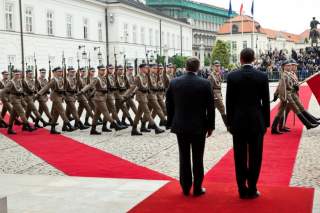Poland and America: Together Forever?
"Poland’s tragic history commands sympathy, but Americans should object strenuously to the offensive ambitions the alliance has lately embraced."
As allies, we have a solemn duty—a binding treaty obligation—to defend your territorial integrity. And we will. We stand together—now and forever—for your freedom is ours. Poland will never stand alone. But not just Poland—Estonia will never stand alone. Latvia will never stand alone. Lithuania will never stand alone. Romania will never stand alone. These are not just words. They’re unbreakable commitments backed by the strongest alliance in the world and the armed forces of the United States of America—the most powerful military in history.
Fulsome as this was, the Poles don’t quite believe it. They want the United States to establish a “major base” on their territory. “There are major bases in Britain, in Spain, in Portugal, in Greece, in Italy,” Sikorski said. “Why not here?” The United States, leery of breaking a 1997 agreement with Russia promising that no permanent NATO bases would be established in eastern Europe, has instead promised to keep moving different contingents in and out of Poland. Remember the oldest established permanent floating crap game in New York? That’s the new plan for NATO’s East. But the Poles consider these steps gravely insufficient. If you mean it, they say, prove it. Violate your agreement with the Russians, for the good and sufficient reason that the Russians have violated their agreements with you. Give maximum support to Ukraine against Russia. Press onward against the bear.
* * *
The larger lesson from the Ukraine crisis is that the demands for reassurance by Poland and other eastern European states have required and continue to require the penetration of the Russian strategic glacis. The best defense, the easterners think, is a good offense. Satisfying those demands dictates a fundamentally hostile attitude toward traditional Russian interests on the part of the United States, and this in a world where U.S. ambitions also push it strongly against China, Iran and a passel of lesser states and “threats.”
Polish demands for reassurance are symptomatic of a larger view that links American neoconservatives with those who live in the shadow of Russian power in Europe. Lambasting the West’s response to the Ukraine crisis as the epitome of weakness, the Kyiv Post recently editorialized, “Courageous leaders should see Russia’s assault on Ukraine and the global world order for the opportunity it presents to get rid of Putinism, once and for all, and with it the other post-Soviet dictatorships of Ilham Aliyev, Alexander Lukashenko, Nursultan Nazarbayev and so on.”
Such a goal is an infallible recipe for unrelenting political and perhaps military conflict with Moscow, but these ambitious aims are quite pronounced in Eastern Europe, just as they represent the fondest hopes of our own neocons and liberal hawks. John McCain’s interventionist inclinations make him badly out of sync with American domestic opinion. But he is a hero in Warsaw, Kiev and Tbilisi.
American strategy since the end of the Cold War has been based on the assumption that NATO could push and push without Russia ever pushing back, save through stern and ineffectual diplomatic protests. The more states that were added to NATO’s east, the more the sentiment grew to push yet further. When Russia did finally say “enough!” after the Washington-sponsored armed rebellion in Kiev, the hawks’ worldview of a Russia bent on aggression was miraculously confirmed. It was all done in the name of peace, of course, but on these simple principles of simple peacemaking, one could aggravate any conflict in the world.
It should be obvious that the more American power presses eastward against Russia, the more the credibility of its guarantee will be called into question. To say otherwise ignores the “balance of interests” as against the “balance of power” as a factor in the resolution of international crises. That means the Poles are fated by their position and history to undergo repeated iterations of the psychological drama in which they feel compelled to pucker up, but know deep down that they’re likely to get screwed.
Poland’s tragic history commands sympathy, but Americans should object strenuously to the offensive ambitions the alliance has lately embraced. Achieving those ambitions has become the litmus test for the U.S. reassurance these little states crave. The pattern, alas, has become depressingly familiar for NATO as a whole. If New Europe has lately been very forward, Old Europe provided the example—witness the aggressive attitude taken by France and Britain in the overthrow of Qaddafi and the attempted overthrow of Assad. What in an earlier era would have qualified as object lessons in aggression pass muster today as defensive exercises mounted under the banner of spreading democracy and protecting human rights. That they don’t actually do so—see Iraq, Libya, Syria and now Ukraine—never seems to impair the purity of the objective.
In the 1990s, the mantra of the security establishment was that NATO had to go “out of area” or “out of business.” After a decade and more of NATO-supported political and military adventurism, that formula needs revision: repeatedly going out of area, with reckless disregard for NATO’s nominal defensive function, may yet prove the formula for the alliance’s demise.
A NATO that has been surreptitiously converted from a defensive to an offensive alliance no longer deserves the support of the American people. The U.S. security establishment seems rather pleased with the outcome—it gives them something to do while fattening their wallets—but the public is beginning to see through the shell game. An agonizing reappraisal is very much in order.
David Hendrickson is professor of political science at Colorado College. He is the author of Union, Nation, or Empire: The American Debate over International Relations, 1789-1941 (Kansas, 2009).

